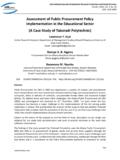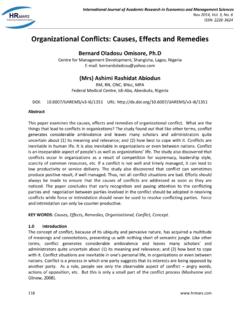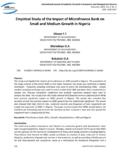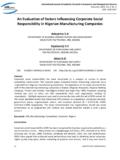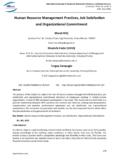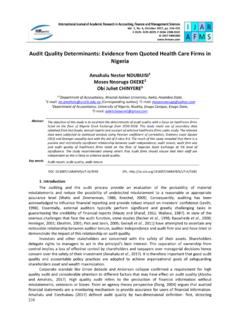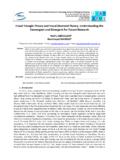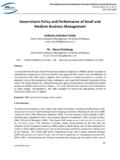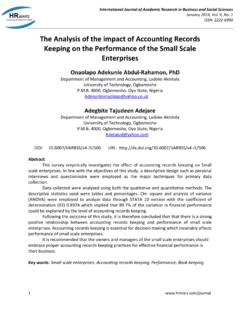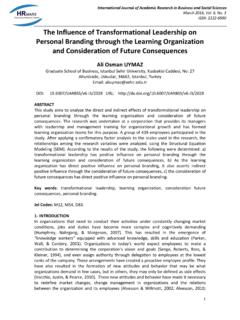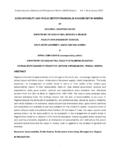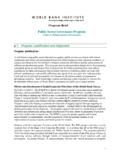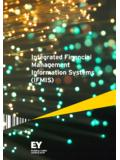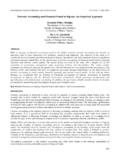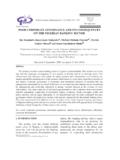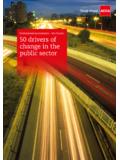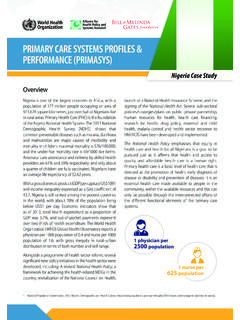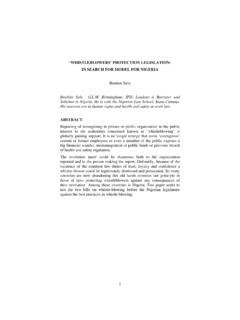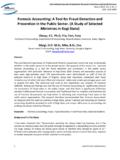Transcription of Financial Reporting in Small and Medium …
1 International Journal of Academic Research in Accounting, Finance and management Sciences Vol. 7, , January 2017, pp. 1 10 E-ISSN: 2225-8329, P-ISSN: 2308-0337 2017 HRMARS Financial Reporting in Small and Medium Enterprises (SMEs) in Nigeria. Challenges and Options Charles EZEAGBA Department of Accountancy, Nnamdi Azikiwe University, Awka, Nigeria E-mail: Abstract This study is on Financial Reporting in Small and Medium Enterprises (SMEs) in Nigeria: challenges and options. The study was carried out to determine the challenges facing Small and Medium Enterprises (SMEs) in adopting effective Financial accounting Reporting in Nigeria and to ascertain the contribution of poor credit facilities to inadequate accounting records in SMEs in Nigeria.
2 Survey method and time series data were used and data were collected through the use of questionnaire and CBN statistical bulletin. Data generated were analyzed with simple percentage table. The study found that the challenges facing SMEs in preparation and presentation of Financial reports are: inadequate accounting books and records, manpower, accounting system and non-running their transactions through the banking system. The study recommends among others that since keeping proper books of account and preparation of Financial records can only be done by professional accountants, the two main bodies in Nigeria: ICAN and ANAN should encourage their members to offer free professional service to SMEs in Nigeria.
3 Key words Financial Reporting , Small and Medium enterprises, challenges and options DOI: URL: 1. Introduction There are many accounting standards in the world, with each country using a version of their own generally accepted accounting principles (GAAP). These allow firms to report their Financial statements in accordance with the GAAP that applies to them. The complication arises when whether the firm does business in multiple countries (Modugu and Eragbhe, 2001). However, the harmonization and international convergence of accounting standards and practices are of interest to researchers in both developed and developing countries.
4 For the past decade, members of the accounting profession have been anticipating the adoption of the IFRS (Securities and Exchange Commission, 2010 as cited in Winney, Marshall, Bender, Swiger, 2010) and this anticipation has prompted a lot of academic research on the subject of adoption of IFRS by different countries of the world- Nigeria is not exempted. As a result of this, the Financial Reporting Council of Nigeria (FRCN) announced the transition date for adopting IFRS for SMEs in Nigeria to begin from January 1, 2012 (Report of the Committee on Road Map to the Adoption of International Financial Reporting Standards in Nigeria, 2010).
5 Modugu and Eragbhe (2013) affirmed that Small and Medium Enterprises (SMEs) contribute over 90% of the private sector production and they are the prime sources of jobs in developing countries and play a crucial role in income generation especially for the poor. There is currently no clear cut definition of an SME in Nigeria. In the context of IFRS, SMEs are entities that do not have public accountability and publish general purpose Financial statements or follow generally accepted accounting principles (GAAP). Public accountability in this context connotes entities with or seeking to have their securities traded in a public market or have assets in a fiduciary capacity as their main business activities.
6 Since the official announcement of the mandatory adoption and implementation of IFRS in the European Union in 2002, accounting research has examined the process, especially the impact, progress and difficulties it entails (Callao et al., 2007). However, most of the previous studies on adoption of international accounting standards by countries are country specific (Gyasi, 2010) and the focus of most literature have been larger firms, sometimes only listed firms (Anacoreta and Silva, 2005). The level of International Journal of Academic Research in Accounting, Finance and management Sciences Vol.
7 7 (1), pp. 1 10, 2017 HRMARS 2 preparedness of Nigeria for the adoption of IFRS for SMEs with regards to the roadmap announced by the FRCN is not known with empiricism. The place of sound accounting and internal control systems in any business, irrespective of its scale, cannot be overemphasized. A vast majority of Small -scale businesses cannot afford the complexity of a detailed accounting system even if they would have, hence, the existence of single entries in their books and in some cases on incomplete records (Wood, 1979; Onaolapo et al.)
8 , 2011). Audits of Small scale enterprises have proven to be among the most worrisome for professional accountants because of the inadequacy of the internal controls. Except for statutory demands, Small and Medium scale enterprises hardly give serious thoughts to the process of sound accounting, yet the inadequacy and ineffectiveness of accounting processes have been responsible for untimely collapse of a host of them (Mukaila and Adeyemi, 2011). Much of studies have been conducted on Financial Reporting in SMEs in Nigeria etc. Some of these works include Fowokan (2011), Okafor and Ogiedu (2011), Eke, Onafalujo and Akinlabi (2011).
9 Moreover, there has been limited research on those challenges and their effect on Small and Medium enterprises in Nigeria. Objective of the study 1. To determine the challenges facing Small and Medium Enterprises (SMEs) in adopting effective Financial accounting Reporting in Nigeria. 2. To ascertain the contribution of poor credit facilities to inadequate accounting records in SMEs in Nigeria. Research questions 1. What are those challenges facing Small and Medium Enterprises (SMEs) in adopting effective Financial Reporting in Nigeria? 2.
10 To what extent do poor credit facilities contribute to inadequate accounting records in SMEs in Nigeria? Hypotheses 1. HO: There are challenges facing Small and Medium Enterprises (SMEs) in adopting effective Financial accounting Reporting in Nigeria. 2. HO: Poor credit facilities to SMEs in relation to other private sector do not contribute to inadequate accounting records of SMEs in Nigeria. 2. Literature review Conceptual framework The definition of SMEs differs with jurisdiction (PricewaterhouseCoopers, 2009) and there is no consensus on the real definition of Small and Medium scale enterprises (SMEs) as the terms, ' Small ' and ' Medium ' are relative and they differ from industry to industry and country to country.
